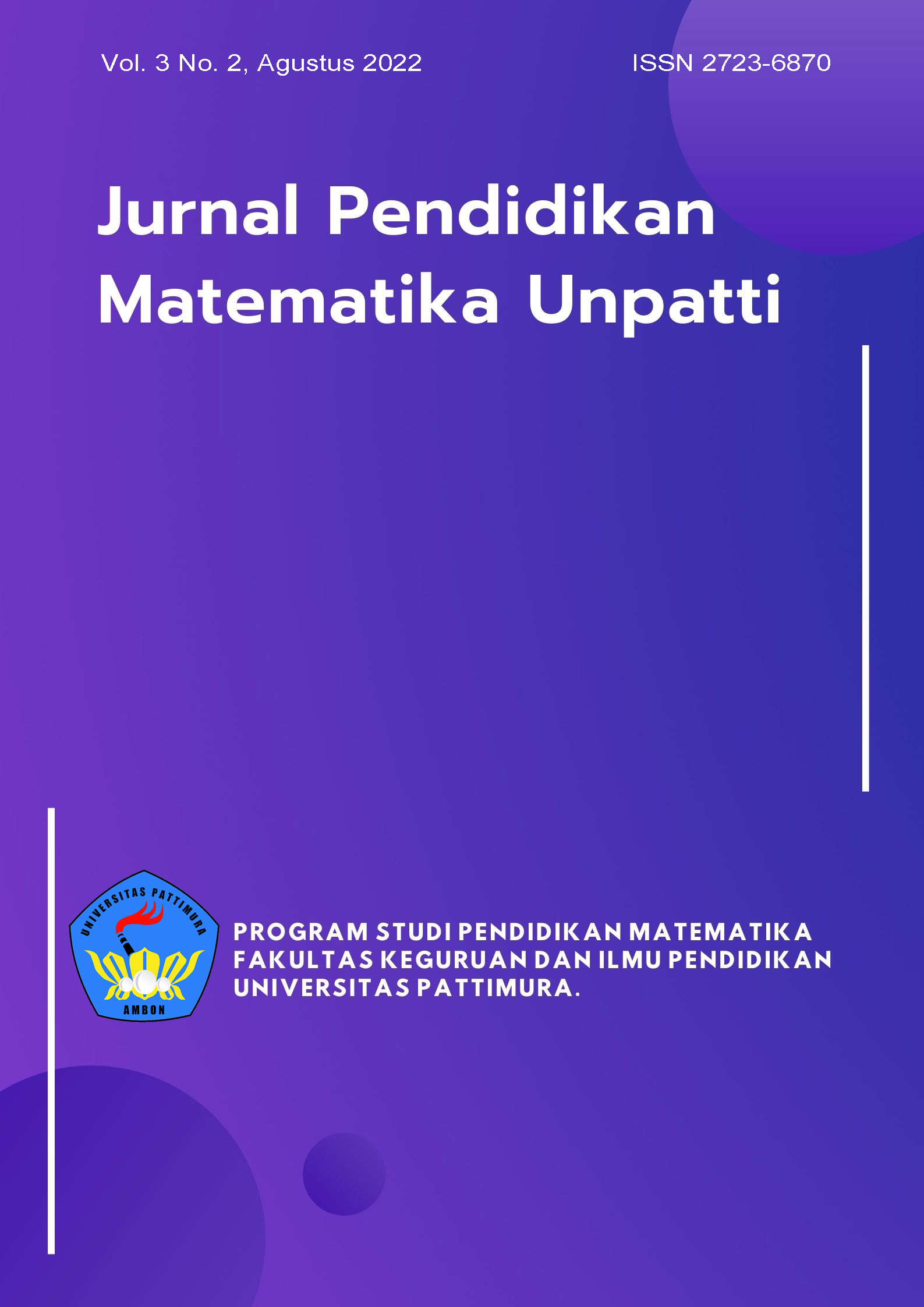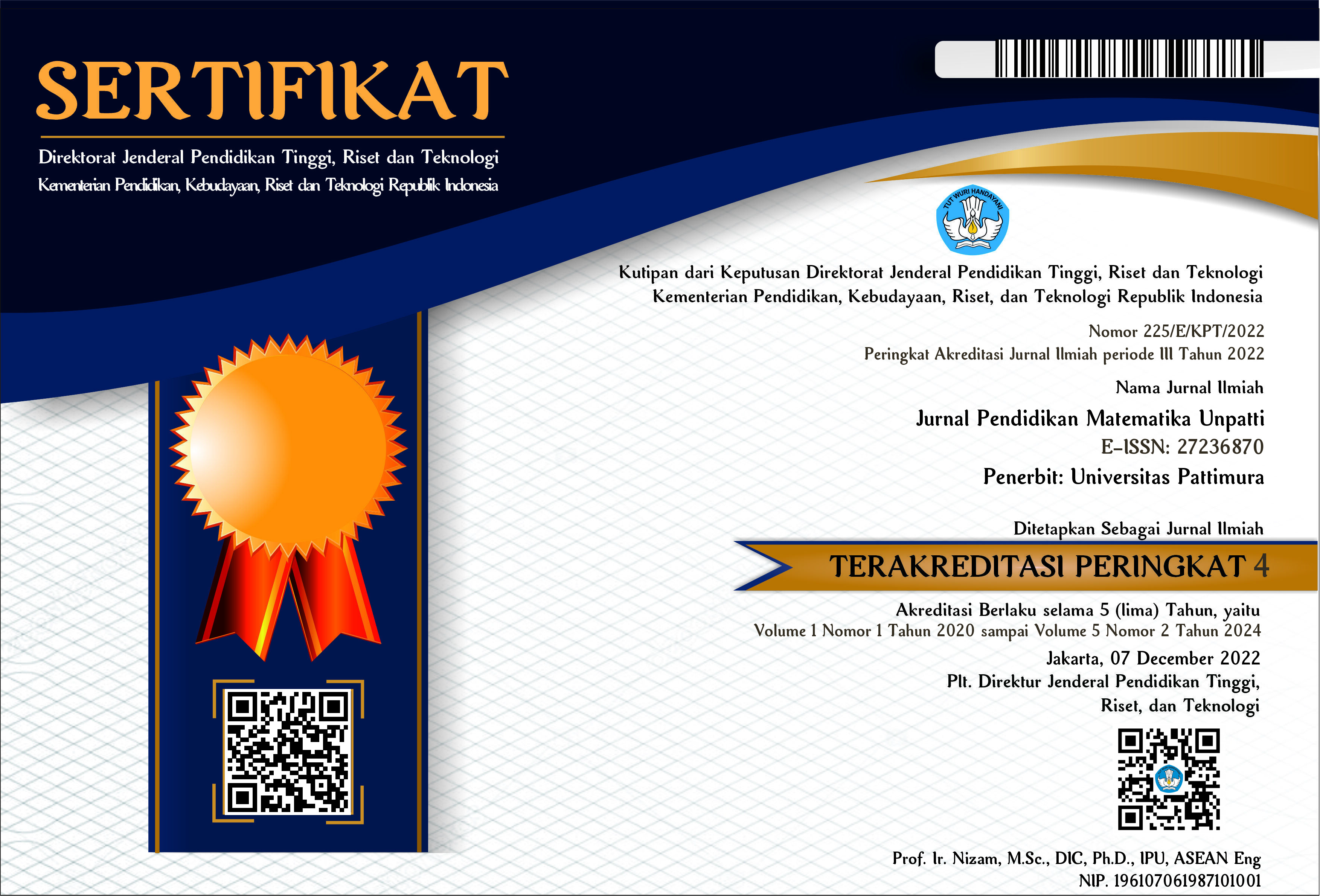ANALISIS KESULITAN SISWA DALAM MENYELESAIKAN SOAL TURUNAN FUNGSI ALJABAR DITINJAU DARI KECERDASAN EMOSIONAL
Abstract
This study aims to analyze and describe students difficulties in solving problems derived from algebraic functions in terms of emotional intelligence in class XI SMA Negeri 4 Central Maluku. This type of research is quantitative-qualitative research. The source of data in this study was students of class XI MIPA 3 SMA Negeri 4 Central Maluku with a total of 28 students, and the subjects in this study were 2 students including 1 student in the high emotional intelligence category, and 1 student representing the medium emotional intelligence category. The instruments used in this study were emotional intelligence questionnaires, algebraic function derivative test questions and interviews. The results showed that the difficulties experienced by students of class XI MIPA 3 SMA Negeri 4 Central Maluku in solving problems derived from algebraic functions include difficulties in understanding concepts, difficulties in understanding principles, and difficulties in operation. The results of the emotional intelligence questionnaire showed that the emotional intelligence of students of SMA Negeri 4 Central Maluku was in the high category. The results of the questionnaire averaged the percentage of emotional intelligence of students with high categories of 71.43%, emotional intelligence of students with moderate categories of 28.57%, and the average emotional intelligence of students with low categories of 0%, meaning that none of the students had low levels of emotional intelligence
Downloads
References
Abdurrahman, Mulyono. 2003. Pendidikan Bagi Anak Berkesulitan Belajar. Jakarta: PT Rineka Cipta.
Abdurrahman, Mulyono. 2010. Pendidikan Bagi Anak Berkesulitan Belajar. Cet. 2. Jakarta:PT. Rineka Cipta.
Abdurrahman, Mulyono. 2012. Anak Berkesulitan Belajar, Teori, Diagnosis, dan Remediasi. Jakarta: PT. Rineka Cipta
Aliah, N. S. M Sukmawati, S., Hidayat, W., Rohaeti, E. E. 2020. Analisis Kemampuan Pemecahan Masalah Matematika dan Disposisi Matematika Siswa Pada Materi SPLDV. Jurnal Pembelajaran Matematika Inovatif. Vol 3, No 2.
Aunurrahman. 2011. Belajar dan Pembelajaran. Bandung: Alfabeta.
Daniel Goleman. 2018. .Emotional Intelligence Kecerdasan Emosional. Jakarta: PT Gramedia.
Dwidarti, U., Mampouw, H. L., & Setyadi, D. (2019). Analisis Kesulitan Siswa dalam Menyelesaikan Soal Cerita pada Materi Himpunan. Cendikia, 3(2), 315–322.
Firda Widya Rahma. “Hubungan Kecerdasan Emosional dengan Hasil Belajar Matematika Siswa Kelas V SD Negeri 4 Metro Pusat”, Skripsi Program Studi Pendidikan Guru Sekolah Dasar Fakultas Keguruan dan Ilmu Pendidikan Universtas Lampung, (2014), h. 5.
Hastari Ratri. 2018. Analisis Kesulitan Penyelesaian Soal Matematika Ditinjau Dari Kecedasan Emosional Mahasiswa Di Kabupaten Tulungagung. Jurnal Nasional Pendidikan Matematika. Vol.2, No.2.
Indra, S. W. 2013. Tingkat kecerdasan emosional siswa yang mengikuti ekstrakurikuler olahraga dan yang tidak mangikuti ekstrakurikuler olahraga di SMK PGRI SENTOLO. Skripsi. Universitas Negeri Yogyakarta, Yokyakarta
Kemendikbud. 2015. Matematika SMA kelas XI Kurikulum 2013. Jakarta: Kemendikbud.
Orhun, N. (2012). Graphical Understanding in Mathematics Education: Derivative functionand students difficulties. Procedia–Sosial and Behaviour Sciences, 55, 679-684.
Rahayu, T.D. 2013. Analisis kesalahan siswa kelas XI TKJ SMK Kuncup Samigaluh dalam menyelesaikan soal uraian pada materi limit dan turunan. Jurnal Pendidikan Matematika UNION. 1(1): 33-41.
Saraswati, S. M. P., Agustika, S. N. G. (2020). Kemampuan Berpikir Tingkat Tinggi Dalam Menyelesaikan Soal HOTS Mata Pelajaran Matematika. Jurnal Ilmia Pendidikan Matematika.
Sari, D.P. & Rahardi, R. (2013). Peningkatan Keaktifan dan Hasil Belajar Siswa
Kelas XI IPS 2 SMA Negri 1 Turen pada Pokok Bahasan Turunan dengan
Pembelajaran Kooperatif Tipe Team Games Turnament (TGT). Jurnal
Pendidikan Universitas Negri Malang.
Sari, R. U., Mukhni, & Mirna. (2014). Analisis kemampuan siswa dalam memahami materi turunan kelas XI IPS SMAN Pariaman. Jurnal Pendidikan Matematika. 3(1): 22-25.
Sugiyono. 2014. Metode Penelitian Pendidikan Pendekatan Kuantitatif, Kualitatif, dan R&D. Bandung: Alfabeta.
Sugiyono. 2015. Metode Penelitian Pendidikan. Bandung: Alfabeta.
Sugiyono. (2017). Metode Penelitian Kuantitatif, Kualitatif, dan R&D. Bandung: Alfabeta.
Zanthy, L. S. (2016). Pengaruh Motivasi Belajar Ditinjau dari Latar Belakang Pilihan Jurusan Terhadap Kemampuan Berpikir Kritis Mahasiswa di Stkip Siliwangi Bandung. Teori Dan Riset Matematika.
Copyright (c) 2022 Marselina Elizabeth Lepertery, Carolina Selfisina Ayal, Anderson Leonardo Palinussa

This work is licensed under a Creative Commons Attribution 4.0 International License.
Jurnal Pendidikan Matematika Unpatti is an Open Access Journal. The authors who publish the manuscript in Jurnal Pendidikan Matematika Unpatti agree to the following terms:
Jurnal Pendidikan Matematika Unpatti is licensed under a Creative Commons Attribution 4.0 International . This permits anyone to copy, redistribute, remix, transmit and adapt the work provided the original work and source is appropriately cited.
This means:
(1) Under the CC-BY license, authors retain ownership of the copyright for their article, but authors grant others permission to use the content of publications in Jurnal Pendidikan Matematika Unpatti in whole or in part provided that the original work is properly cited. Users (redistributors) of Jurnal Pendidikan Matematika Unpatti are required to cite the original source, including the author's names, Jurnal Pendidikan Matematika Unpatti as the initial source of publication, year of publication, volume number, issue, and Digital Object Identifier (DOI); (2) Authors grant Jurnal Pendidikan Matematika Unpatti the right of first publication. Although authors remain the copyright owner.





